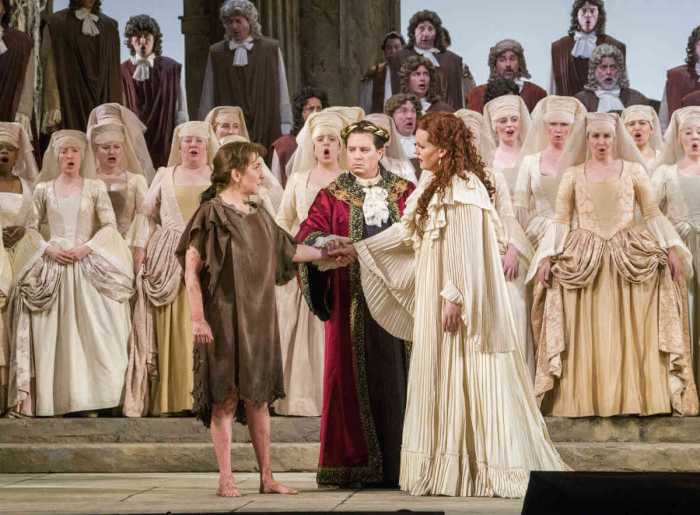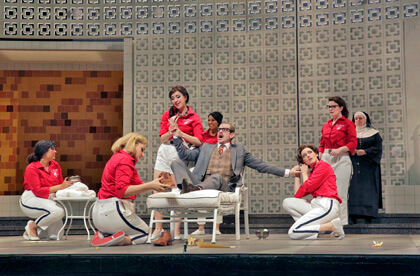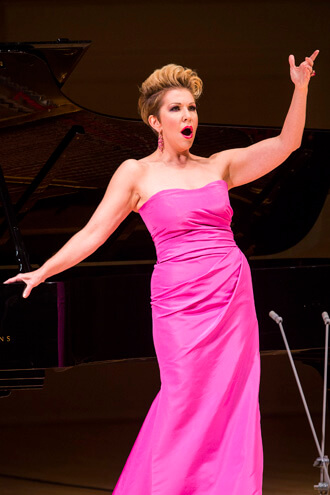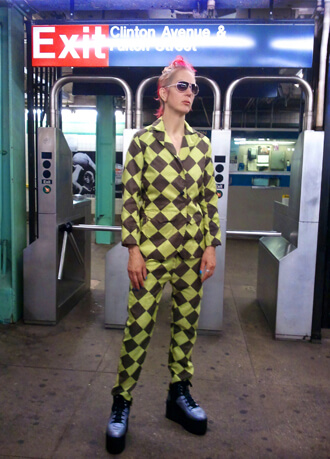Juan Diego Flórez and Joyce DiDonato in Rossini’s “La Donna del Lago.” | KEN HOWARD/ METROPOLITAN OPERA
The standard mid 20th century critical trope regarding Gioachino Rossini was that his genius was limited to opera buffa and his musical legacy would consist of the “The Barber of Seville” and the “William Tell Overture” (the latter due to the “Lone Ranger” television series). The last 40 years have been a journey of rediscovery, revealing an influential musical genius who composed operas in every genre. Rossini’s serious operas composed for Naples and Paris inspired Meyerbeer, Verdi, and Wagner and charted the future course of Romantic Opera in the 19th century.
Rossini’s “La Donna del Lago” (1819) was adapted from “The Lady of the Lake” by Sir Walter Scott and is the prototype for all Romantic operas set in the mysterious wilds of Scotland — including Bellini’s “I Puritani (di Scozia)” and Donizetti’s “Lucia di Lammermoor” (both also based on Scott). Lilting strings and floating woodwinds summon up misty moors while the brass and drum evoke the semi-primitive warlike spirit of the Scots.
Rossini trots out one showstopper aria after another for five virtuoso singers interspersed with rousing choruses, florid duets, ornate trios, and complex finales. However the libretto of “La Donna del Lago” lacks onstage action and the characters are two-dimensional and do not evolve — they are puppets manipulated by outside events which occur offstage. The music moves but the story sits there — 19th century critic Henry Chorley called the static second act a “concert in costume.” Staging the opera actually does the piece no favors, given that modern directors have no feel for the lyric-idyllic Romantic genre of the piece.
In Rossini’s “La Donna del Lago,” it’s the singing, especially DiDonato’s, that counts
Paul Curran’s production (first seen in Santa Fe) conserves the original period setting with no attempt at romantic picturesque charm. Kevin Knight’s dark, glowering set consists of a central blasted heath flanked on either side by black wall of portals, with set pieces occasionally emerging from below or upstage. On a back scrim are grainy projections of mountains and bleak skies more suitable to Shakespeare’s “Macbeth” than Romantic melodrama.
The titular heroine Elena is supposed to enter floating on the lake in a skiff singing a lilting melody, but here Joyce DiDonato enters upstage center on foot and gathers some scraggly heather. There are attempts at realistic theatrical byplay that do not mesh with Rossini’s ornamental music and stylized dramaturgy.
It is the music and especially the singing that counts here. DiDonato and Juan Diego Flórez having been singing the lead roles all over Europe in various productions — often with John Osborn and Daniela Barcellona in tow. On the February 16 opening night, no one was in their best vocal form — a nervous Osborn dropped high and low notes while Barcellona’s juddering mezzo went in and out of focus all night. DiDonato and Flórez needed most of the long first act to warm up.
At the February 25 performance, DiDonato’s scrupulous musicianship and precise coloratura were wedded to alternately sunny and creamy high mezzo tones. Her spirited yet emotionally conflicted characterization creates a real woman out of romantic cliché. Flórez as King Giacomo (aka James V of Scotland), on the other hand, as always plays himself — the preening charmer flashing his trademark dimpled grin and brassy high C’s with cocky self-assurance. His timbre however, is rather blatant and opaque — often nasal and overly brash except when he floated a few beguiling mezza voce tones. It was in the second act aria “O fiamma soave” that Flórez found his suave seductive groove.
Osborn at the third performance handled Rodrigo di Dhu’s three-part entrance aria with bravura command, capping it with a sustained final high C. He matched Flórez high C for high C in the Act II trio. As Elena’s true love Malcolm, Barcellona’s warmly Italianate mezzo lacks alto depth, brilliance on top, and precision in fast coloratura. The various vocal pieces seem to be there but never come together to give an authoritative reading. Knight costumes the tall and stocky Barcellona in a baggy kilt, long unkempt greasy locks, and an uncouth painted-on five o’clock shadow, creating a convincingly masculine but unprepossessing romantic hero. Oren Gradus as Elena’s father Douglas sounded like a comprimario in a star role — his rough bass lumbered through the florid sections and coarsened the legato phrases.
Conductor Michele Mariotti opts for gently ambling lyrical tempos that rob the score of variety of tempo and color. However, DiDonato climaxes the evening with the rondo finale “Tanti Affetti” — a pyrotechnic display of coruscating scales punctuated with delicate trills, glittering staccato, and floated soprano high notes lighting up the gloomy, ugly set and ending the opera on a triumphant high note.



































